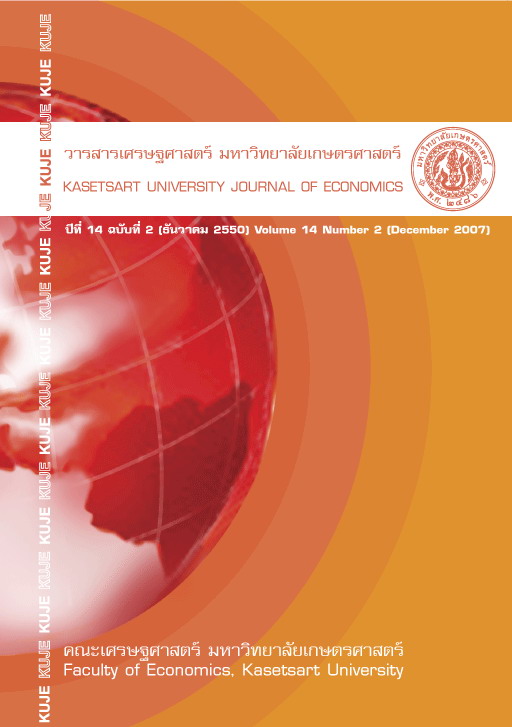การประเมินทางเศรษฐกิจก่อนนำพืชดัดแปรพันธุกรรมมาใช้ในประเทศไทย
Main Article Content
Abstract
บทคัดย่อ
การพัฒนาพืชดัดแปรพันธุกรรมโดยใช้เครื่องมือทางเทคโนโลยีชีวภาพสามารถทำให้ขั้นตอนการพัฒนาสายพันธุ์พืชรวดเร็วและมีโอกาสสำเร็จมากขึ้น อย่างไรก็ตามความไม่แน่ใจในผลกระทบของพืชดัดแปรพันธุกรรมทำให้นโยบายสนับสนุนงานเทคโนโลยีชีวภาพยังไม่มีความชัดเจน นับตั้งแต่ พ.ศ. 2544 การทดลองในแปลงเปิด การใช้พืชดัดแปรพันธุกรรมเพื่อผลิต บริโภค และการค้าเชิงพาณิชย์ถูกระงับ แต่ปัจจุบันมีการนำเรื่องนี้มาพิจารณาใหม่อีกครั้งหนึ่ง การศึกษานี้ประเมินผลกระทบทางเศรษฐกิจหากประเทศไทยอนุญาตให้ใช้มะละกอจีเอ็มและฝ้ายบีที ผลการศึกษาพบว่าเกษตรกรผู้ปลูกฝ้ายบีทีจะได้รับผลประโยชน์จากการเพิ่มผลผลิตและลดต้นทุนรวม แม้ต้นทุนค่าเมล็ดพันธุ์จะสูงขึ้นก็ตาม ส่วนผู้ผลิตมะละกอจีเอ็มจะได้รับผลประโยชน์สูงกว่า แต่ต้นทุนการผลิตจะไม่ลดลง
คำสำคัญ : เทคโนโลยีชีวภาพ, การประเมินทางเศรษฐกิจ, พืชดัดแปรพันธุกรรม
Abstract
Biotechnology can improve the speed and the success rate of plant varietyimprovement. However, concerns over the impact of transgenics have led to policy indecisions onthe use of biotechnology. Since 2001, field trials of transgenic plants have been banned and theiruse for production, consumption, and commercialization has been prohibited, although this ban isbeing reconsidered. This study estimates the economic impact of the adoption of GM papaya andBt cotton to Thailand were the government to authorize the use of transgenic technology. Theresults showed that Bt-cotton farmers would benefit from improved yields and reduced cost evenwith higher seed costs. Benefits would be larger for GM papaya producers even without costreduction.
Keywords : biotechnology, economic evaluation, transgenic plants
Article Details
The paper is published under CC BY-NC-ND, in which the article is freely downloaded and shared in its original form non-commercially and its citation details are identified.


